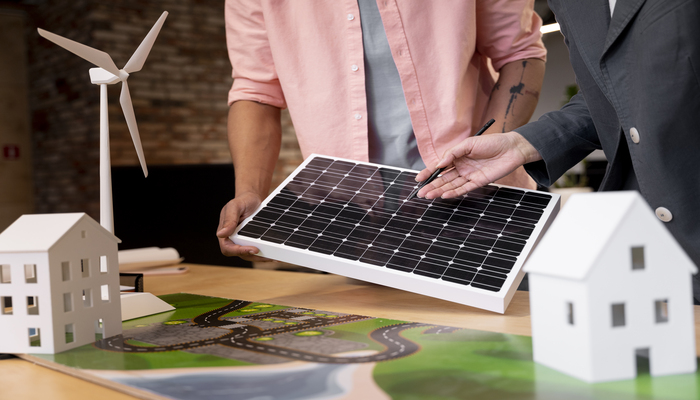As the world continues to focus on sustainable energy solutions, investment in residential solar energy is becoming an increasingly popular choice for homeowners.
In South Africa, where electricity costs have skyrocketed in recent years, solar power offers a viable and eco-friendly solution for reducing monthly energy bills.
The benefits of adopting solar energy in your home extend beyond just saving money; it can also contribute to a cleaner environment, increase the value of your property, and provide a reliable energy source during power outages.
The Rising Cost of Electricity in South Africa
South Africa’s energy sector has faced numerous challenges in recent years, including regular power shortages, rising electricity prices, and frequent load shedding. These issues have led many South African homeowners to seek alternative sources of energy to mitigate the impact of rising electricity costs.
Investment in residential solar is one of the most effective ways to combat these challenges. By harnessing the power of the sun, homeowners can generate their own electricity, reduce their reliance on the grid, and ultimately lower their monthly utility bills.
The Benefits of Solar Energy
There are several key advantages to investment in residential solar energy, particularly for South African households:
1. Significant Energy Savings
One of the most compelling reasons to invest in residential solar is the potential for substantial energy savings. Solar panels generate electricity from sunlight, which means homeowners can reduce their reliance on the national grid.
In South Africa, where electricity prices are among the highest in Africa, this can result in significant savings over time. With solar power, homeowners can offset up to 80% or more of their electricity consumption, depending on the size of the system and the location of their home.
2. Reduced Carbon Footprint
Investment in residential solar also plays a critical role in reducing your carbon footprint. Solar energy is a clean, renewable energy source that does not release harmful emissions or pollutants into the atmosphere.
By switching to solar power, you can significantly reduce your household’s greenhouse gas emissions and contribute to South Africa’s efforts to combat climate change. This not only benefits the environment but also helps you align with global sustainability goals.
3. Increased Property Value
Another reason to consider investment in residential solar is the potential increase in property value. Homes with solar energy systems are seen as more desirable by potential buyers, as they offer lower energy costs and a smaller environmental footprint. Studies have shown that homes with solar panels tend to sell faster and at higher prices than homes without solar energy systems. This makes solar panels not only a good investment for energy savings but also a wise long-term investment in your property’s value.
4. Energy Independence and Security
South Africa’s ongoing power issues, including frequent load shedding, can cause disruptions in daily life. Investment in residential solar provides homeowners with greater energy independence and security.
By installing a solar power system, you can reduce your reliance on the national grid and continue to power essential appliances even during blackouts. With the addition of battery storage, homeowners can store excess energy generated during the day for use at night or during power outages, ensuring that they have a consistent and reliable energy supply.
5. Government Incentives and Tax Breaks
The South African government has introduced several incentives to encourage the adoption of renewable energy solutions, including residential solar energy systems. Homeowners can benefit from tax credits, rebates, and low-interest loans, making it more affordable to install solar panels.
These incentives help to offset the initial costs of investment in residential solar, making it a more accessible option for a wider range of South African households.
How Much Does It Cost to Install Solar Panels?
The upfront cost of installing a solar power system in your home can vary depending on factors such as the size of the system, the type of solar panels used, and the complexity of the installation.
On average, the cost of installing residential solar in South Africa can range from R70,000 to R200,000, depending on these variables. While this may seem like a significant expense, it’s important to consider the long-term savings.
With a well-sized solar system, you can start saving money on your electricity bills immediately. The return on investment (ROI) for solar energy is typically realized within 5 to 10 years, depending on the size of the installation and your energy consumption.
After this period, the energy generated by your solar system is essentially free, allowing you to enjoy decades of energy savings.
Solar Financing Options in South Africa
For homeowners who are concerned about the upfront cost of investment in residential solar, there are various financing options available in South Africa. Many banks and financial institutions offer solar loans with flexible repayment terms, making it easier for homeowners to finance their solar systems.
Additionally, some companies provide leasing options, where you can pay a monthly fee for using solar panels, rather than purchasing the system outright.
These financing options can help ease the financial burden of installing solar panels and allow homeowners to start saving money on their electricity bills right away. With the growing number of financing options available, investment in residential solar has become an increasingly viable option for homeowners in South Africa.
Choosing the Right Solar System for Your Home
When considering investment in residential solar, it’s essential to choose the right solar system for your home. Several factors need to be taken into account, including:
- Energy consumption: The size of your solar system will depend on how much electricity your household uses on a monthly basis. Homeowners with high energy consumption may need a larger system to meet their needs.
- Roof space: Solar panels require adequate roof space to be installed. Before making an investment, it’s important to assess your roof’s size, orientation, and shading to ensure it’s suitable for solar panel installation.
- System type: There are various types of solar systems available, including grid-tied, off-grid, and hybrid systems. A grid-tied system is the most common in South Africa, but off-grid and hybrid systems may be more suitable for homeowners who want to be entirely independent of the national grid.
Consulting with a reputable solar energy provider can help you determine the best system for your needs and ensure that your investment in residential solar is optimized for maximum energy savings.
Conclusion
Investment in residential solar energy is an excellent way for South African homeowners to reduce their energy costs, lower their environmental impact, and increase the value of their property. With the added benefit of government incentives and financing options, solar energy is more accessible than ever before.
Whether you’re looking to save money on your electricity bills, become more energy independent, or contribute to a greener future, residential solar energy is a smart and sustainable investment. By making the switch to solar power, you can take control of your energy future and enjoy the many benefits that come with it.





